- Home
- W. Somerset Maugham
A Writer's Notebook (Vintage International) Page 2
A Writer's Notebook (Vintage International) Read online
Page 2
As I grew older and more aware of my intentions, I used my notebooks less to record my private opinions, and more to put down while still fresh my impressions of such persons and places as seemed likely to be of service to me for the particular purpose I had in view at the moment. Indeed, on one occasion, when I went to China, vaguely thinking that I might write a book upon my travels, my notes were so copious that I abandoned the project and published them as they were. These, of course, I have omitted from this volume. I have likewise omitted everything I have elsewhere made use of, and if I have left in a phrase or two here and there that a diligent reader of my works recalls, it is not because I am so pleased with it that I want to repeat it, but from inadvertence. On one or two occasions, however, I have deliberately left in the facts that I noted down at the time and that gave me the idea for a story or a novel, thinking it might entertain the reader who chanced to remember one or the other, to see on what materials I devised a more elaborate piece. I have never claimed to create anything out of nothing; I have always needed an incident or a character as a starting point, but I have exercised imagination, invention and a sense of the dramatic to make it something of my own.
My early notebooks were largely filled with pages of dialogue for plays that I never wrote, and these because I thought they could interest no one, I have also left out, but I have not left out a considerable number of remarks and reflections that seem to me now exaggerated and foolish. They are the expression of a very young man’s reaction to real life, or what he thought was such, and to liberty, after the sheltered and confined existence, perverted by fond fancies and the reading of novels, which was natural to a boy in the class in which I was born; and they are the expression of his revolt from the ideas and conventions of the environment in which he had been brought up. I think I should have been dishonest with the reader if I had suppressed them. My first notebook is dated 1892; I was then eighteen. I have no wish to make myself out more sensible than I was. I was ignorant, ingenuous, enthusiastic and callow.
My notebooks amounted to fifteen stoutish volumes, but by omitting so much, as I have above described, I have reduced them to one no longer than many a novel. I hope the reader will accept this as a sufficient excuse for its publication. I do not publish it because I am so arrogant as to suppose that my every word deserves to be perpetuated. I publish it because I am interested in the technique of literary production and in the process of creation, and if such a volume as this by some other author came into my hands I should turn to it with avidity. By some happy chance what interests me seems to interest a great many other people; I could never have expected it, and I have never ceased to be surprised at it; but it may be that what has happened so often before will happen again, and some persons may be found who will discover here and there in the following pages something to interest them. I should have looked upon it as an impertinence to publish such a book when I was in the full flow of my literary activity; it would have seemed to claim an importance for myself which would have been offensive to my fellow writers; but now I am an old man, I can be no one’s rival, for I have retired from the hurly-burly and ensconced myself not uncomfortably on the shelf. Any ambition I may have had has long since been satisfied. I contend with none not because none is worth my strife, but because I have said my say and I am well pleased to let others occupy my small place in the world of letters. I have done what I wanted to do and now silence becomes me. I am told that in these days you are quickly forgotten if you do not by some new work keep your name before the public, and I have little doubt that it is true. Well, I am prepared for that. When my obituary notice at last appears in The Times, and they say: “What, I thought he died years ago,” my ghost will gently chuckle.
1892
In this year I entered the Medical School of St. Thomas’s Hospital. I spent five years there. I carefully set down the dates on which I started my first notebooks, and these dates will, I hope, serve as an extenuation of their contents. My later notebooks are undated, indeed many of my notes were scribbled on a scrap of paper or the back of an envelope, and I have had to determine when they were written by their subject matter. It may be that here and there I am a year or two out; I do not think it is of any consequence.
Considering how foolishly people act and how pleasantly they prattle, perhaps it would be better for the world if they talked more and did less.
Music-hall songs provide the dull with wit, just as proverbs provide them with wisdom.
Good luck always brings merit, but merit very seldom brings good luck.
Maxims of the Vicar.
A parson is paid to preach, not to practise.
Only ask those people to stay with you or to dine with you, who can ask you in return.
“Do unto others as you would they should do unto you.” An excellent maxim—for others.
He always answered the contentions of the temperance people by saying that “God has ordered us to make use of the things of this world,” and he exemplified his reply by keeping himself well supplied with whisky and liqueurs, which, however, he kept carefully locked up in the sideboard. “It is not good for all people to drink spirits,” he said, “in fact it is a sin to put temptation in their way; and besides, they would not appreciate them at their true value.”
These observations fell from the lips of my uncle who was Vicar of Whitstable; I took them seriously, but looking back on them now, I am inclined to think that he was exercising at my expense a humour which I never suspected him of possessing.
Reading does not make a man wise; it only makes him learned.
Respectability is the cloak under which fools cover their stupidity.
No action is in itself good or bad, but only such according to convention.
An old maid is always poor. When a spinster is rich she is an unmarried woman of a certain age.
Genius should use mediocrity as ink wherewith to write its name in the annals of the world.
Genius is talent provided with ideals.
Genius starves while talent wears purple and fine linen.
The man of genius of today will in fifty years’ time be in most cases no more than a man of talent.
A visit to a picture gallery with a friend is, perhaps, the severest test you can put him to. Most people, on going to a gallery, leave politeness and courtesy, with their umbrellas and sticks, at the door. They step in stripped of their veneer, and display their dispositions in all their nakedness. Then you will find them dogmatic and arrogant, flippant and foolish, impatient of contradiction and even of difference of opinion. Neither do they then seek to hide their opinion of you; for the most part it is a very unfavourable one.
The man who in these conditions listens tolerantly to your opinion and allows that you may be as right as he, is a friend indeed.
But, first of all, are you perfectly convinced of my friendship, are you so assured of it that I may speak to you of the most personal subject?
Certainly, my dear boy, a heart as true as yours has the right to say the most unpleasant things. Go on.
Brooks. He is a man under the middle size, broad and sturdy and well-shaped; with a beautiful head, a good nose, and a broad, high forehead; but his face, clean-shaven, narrows down to a pointed chin; his eyes are pale blue, slightly expressionless; his mouth is large and his lips are thick and sensual; his hair is curly but getting thin; and he wears it long. He has a look of refinement and a romantic air.
When he went up to Cambridge he got into a set of men with money and of sporting tastes, among whom his intelligence was deemed exceptional; an opinion which was shared by his tutor and the master of his college. He ate his dinners and read for the Bar. He took a second class. When he went to London, he dressed at an expensive tailor’s, kept a mistress, was elected to the Reform, which his friends made him join under the impression that he had in him the makings of a politician. His friends were reading men, and he went through a course of English classics in a light amateurish manner. He admired Geor
ge Meredith and was scornful of the three-volume novel. He became a diligent reader of the weekly sixpennies, of the literary monthlies and the quarterlies. He went a good deal to the theatre and to the opera. Other evenings he spent either in a friend’s room or at some old-fashioned inn, drinking whisky and smoking, discussing far into the night life and death, fate, Christianity, books and politics. He read Newman, and was impressed by him, and the Roman Catholicism which he found at Brompton intensely attracted him. Then he fell ill and, on recovering, went to Germany. Here he met people whose pursuits and predilections were different from those of his former companions. He began to learn German, and with this object, read the German classics. He added an admiration of Goethe to his old admiration of Meredith and Newman. On going to Italy for a short holiday, he fell in love with the country and, after a few more months in Germany, returned to it.
He read Dante and Boccaccio; but he came in contact with men, scholars, who had a passion for the classic writers of Greece and Rome, and found that they did not think very highly of the dilettante spirit in which he worked. Always very easily influenced, every new impression producing its effect on him, he quickly adopted the outlook of his new friends; he began to read Greek and Latin.
He professes a great admiration for the beautiful; he will rave over a Botticelli, snow-covered Alps, the sun setting over the sea, all the things which are regularly and commonly admired; but will not see the simple beauties that are all around him. He is not a humbug; he admires what he admires sincerely and with real enthusiasm; but he can see beauty only if it is pointed out to him. He can discover nothing for him self. He intends to write, but for that he has neither energy, imagination, nor will. He is mechanically industrious, but intellectually lazy. For the last two years he has been studying Leopardi with the purpose of translating some of his works, but as yet has not set pen to paper. Because he has lived so much alone, he has acquired a great conceit of himself. He is scornful of the philistine. He is supercilious. Whenever anyone starts a conversation he will utter a few platitudes with an air of profound wisdom as if he had settled the question and there was nothing more to be said. He is extremely sensitive and is hurt if you do not accept his own opinion of himself. He has a craving for admiration. He is weak, vain and profoundly selfish; but amiable when it costs him nothing to be so and, if you take care to butter him up, sympathetic. He has good taste and a genuine feeling for literature. He has never had an original idea in his life, but he is a sensitive and keen-sighted observer of the obvious.
How happy life would be if an undertaking retained to the end the delight of its beginning, if the dregs of a cup of wine were as sweet as the first sip.
However much you may dislike a relation, and whatever ill you may yourself say of him, you do not like others to say anything which shows him in a ridiculous or objectionable light; since the discredit thrown on your relation reflects upon yourself and wounds your vanity.
At the hospital. Two men were great friends; they lunched together, worked together and played together: they were inseparable. One of them went home for a few days, and in his absence the other got blood-poisoning at a post-mortem and forty-eight hours later died. The first came back; he’d made an appointment to meet his friend in the P.M. room; when he went in he found him lying on a slab naked and dead.
“It gave me quite a turn,” he said when he told me.
I had just come from London. I went into the dining-room and there I saw my old aunt sitting at her table and at work. The lamp was lit. I went up to her and touched her on the shoulder; she gave a little cry and then, seeing it was I, sprang up and put her thin arms round my neck and kissed me.
“Ah, darling boy,” she said, “I thought I should never see you again.” Then, with a sigh, she leaned her poor old head on my breast: “I feel so sad, Willie; I know that I am passing away; I shall never see the winter out. I had wished that your dear uncle might go first, so that he might be spared the grief of my death.”
The tears came into my eyes and began to run down my cheeks. Then I knew that I had been dreaming, for I remembered that my aunt had been dead nearly two years, and that, almost before she had slept out the beauty-sleep of death, my uncle had married again.
Last year there was a bad storm in St. Ives’ Bay and an Italian ship was caught in it. The ship was going down; a rocket was sent, but the sailors didn’t seem to know how to use the apparatus; they were in sight of land, with every possibility of saving themselves, and were helpless. Mrs. Ellis told me that she stayed at her cottage window, looking at the ship as it sank; the agony was so terrible that at last she felt she could bear it no longer and she went into the kitchen and there spent the night praying.
Most people are such fools that it really is no great compliment to say that a man is above the average.
How ugly most people are! It’s a pity they don’t try to make up for it by being agreeable.
She’s unmarried. She told me that in her opinion marriage was bound to be a failure if a woman could only have one husband at a time.
How the gods must have chuckled when they added Hope to the evils with which they filled Pandora’s box, for they knew very well that this was the cruellest evil of them all, since it is Hope that lures mankind to endure its misery to the end.
This morning Caserio Santo, the assassin of President Carnot, was executed; the papers are full of phrases such as: Santo died like a coward.
But surely he didn’t; it is true that he trembled so that he could scarcely walk to the scaffold, and his last words were spoken in so weak a voice as hardly to be audible, but these words were the assertion of his faith: Vive l’Anarchie. He was faithful to his principles to the last; his mind was as free from cowardice and as firm as when he struck the blow which he knew must be expiated by his own death. That he trembled and could scarcely speak are the signs of the physical terror of death, which the bravest may feel, but that he spoke the words he did shows strange courage. The flesh was weak, but the spirit unconquerable.
1894
These last days everyone has been in a singular state of excitement about a possible war between the English and the French.
A week ago nothing was heard of it; no one dreamt of such an event; but last Saturday the papers began to mention that there were strained relations between the two countries. Even then no word of war was spoken, and when it was suggested everyone laughed at the absurdity. On the following day the papers were more explicit; the cause of the trouble was Madagascar, which the French wished to annex. The papers talked of grave complications and began to suggest that it might be necessary to fight; but still among private people it was looked upon as a groundless scare, for they argued that the French would never be so foolish as to provoke a war; and now today, Wednesday, the third of October, the town was startled by an announcement that a Cabinet council had been hastily summoned, the ministers, who were all away, having been suddenly called back to London.
As the day wore on the excitement increased: people talked of the growing jealousy of the French and of their intrigues in Siam and the Congo; papers were eagerly bought, and the articles on the subject, which were accompanied with maps of Madagascar, read. On the Exchange there has been a panic; stocks have fallen and war has been the subject of every conversation: the city men have been talking of volunteering. Wherever you go people ask for news. Everyone is anxious. There is no ill will towards the French, but a firm determination to fight if need be. The Government does not arouse confidence, for it is well known to be divided; and although there is trust in Lord Rosebery, it is common knowledge that some of the other members of the Cabinet are in disagreement with him, and it is thought that they may hinder him from doing. anything. There is a general feeling that if England submits to another rebuff from France the Government will be overthrown. The anxiety, the dread of war are great, and there is a general consensus of opinion that though it may be delayed, such is the greed, pride and jealousy of the French, it must eventually
break out. But if it does, few people will know its cause; why exactly there should be trouble about Madagascar, no one has the slightest idea.
This evening I went to see some men, and on my way passed two postmen talking of the common topic. When I arrived I found my friends in the same agitated state as everyone else. We spoke of nothing else. We compared the feeling between the French and Germans before the war of 1870 with the feeling now. We talked of Crécy and Agincourt, of Pitt and Wellington. There was a long discussion about the first movements of the war: we talked about what would happen if the French landed an army on the English coast; where they would land; what would be their movements; and how they would be prevented from taking London.
October 4th. The scare is over. The reason of the Cabinet council has been explained, namely to provide for the safety of British subjects in Pekin, and consequently matters have resumed their former state. The public, however, is somewhat indignant at having been so misled; they ask what need there was to keep secret the motive for suddenly summoning a council, especially as it must have been foreseen that a panic would be caused and a great deal of money lost on the Exchange. The journalists who have been the chief agents in the trouble are angry that they should have been led into such foolishness.
Annandale. I noticed that he had turned two statuettes that were in his room with their faces to the wall, and I asked him why. He said there was so much more character in the back of things.
Annandale: “I often think life must be quite different to a man called Smith; it can have neither poetry nor distinction.”

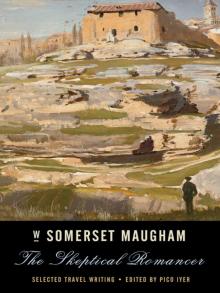 The Skeptical Romancer: Selected Travel Writing
The Skeptical Romancer: Selected Travel Writing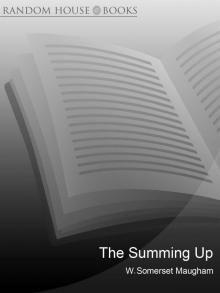 The Summing Up
The Summing Up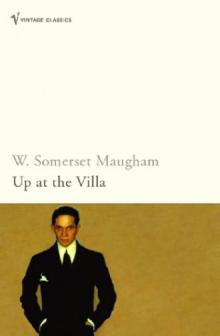 Up at the Villa
Up at the Villa The Razor's Edge
The Razor's Edge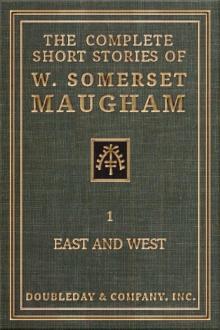 The Complete Short Stories of W. Somerset Maugham: East and West (Vol. 1 of 2))
The Complete Short Stories of W. Somerset Maugham: East and West (Vol. 1 of 2))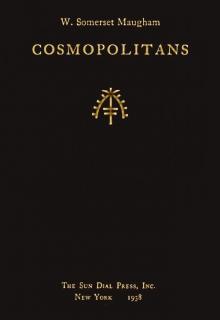 Cosmopolitans
Cosmopolitans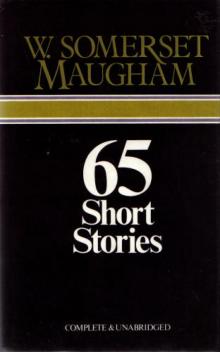 65 Short Stories
65 Short Stories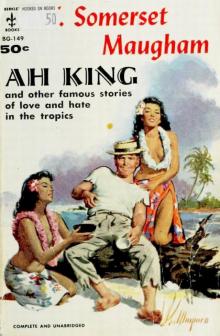 Ah King (Works of W. Somerset Maugham)
Ah King (Works of W. Somerset Maugham) Collected Short Stories: Volume 1
Collected Short Stories: Volume 1 Collected Short Stories Volume 2
Collected Short Stories Volume 2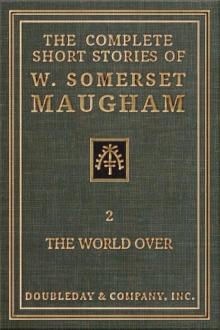 The Complete Short Stories of W. Somerset Maugham - II - The World Over
The Complete Short Stories of W. Somerset Maugham - II - The World Over Collected Short Stories Volume 4
Collected Short Stories Volume 4 Theatre
Theatre Short Stories
Short Stories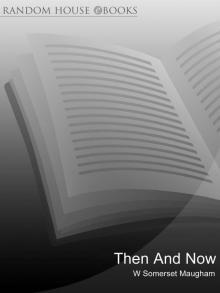 Then and Now
Then and Now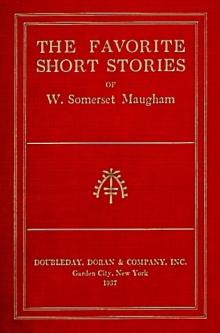 The Favorite Short Stories of W. Somerset Maugham
The Favorite Short Stories of W. Somerset Maugham Of Human Bondage
Of Human Bondage The Magician
The Magician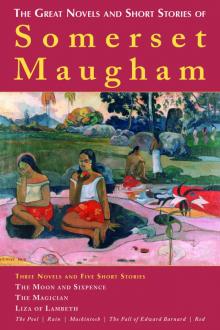 The Great Exotic Novels and Short Stories of Somerset Maugham
The Great Exotic Novels and Short Stories of Somerset Maugham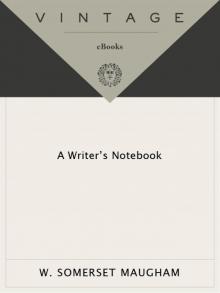 A Writer's Notebook
A Writer's Notebook Christmas Holiday
Christmas Holiday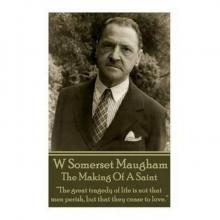 The Making of a Saint
The Making of a Saint Merry Go Round
Merry Go Round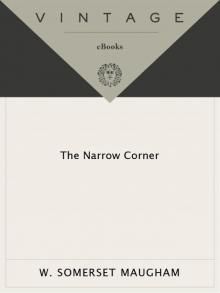 The Narrow Corner
The Narrow Corner Collected Short Stories Volume 3
Collected Short Stories Volume 3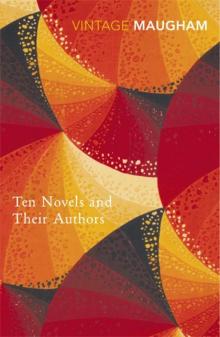 Ten Novels and Their Authors
Ten Novels and Their Authors Ashenden
Ashenden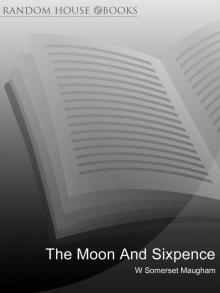 The Moon and Sixpence
The Moon and Sixpence Cakes and Ale
Cakes and Ale Liza of Lambeth
Liza of Lambeth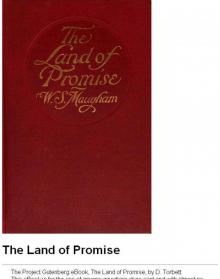 The Land of Promise: A Comedy in Four Acts (1922)
The Land of Promise: A Comedy in Four Acts (1922) A Writer's Notebook (Vintage International)
A Writer's Notebook (Vintage International)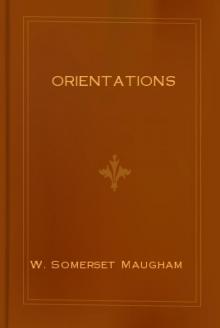 Orientations
Orientations Selected Masterpieces
Selected Masterpieces Mrs Craddock
Mrs Craddock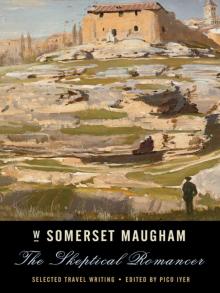 The Skeptical Romancer
The Skeptical Romancer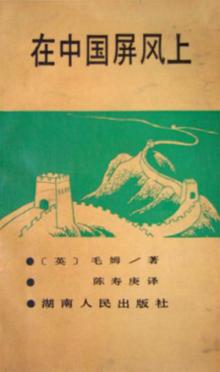 On a Chinese Screen
On a Chinese Screen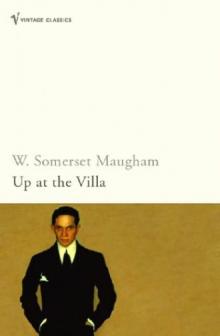 (1941) Up at the Villa
(1941) Up at the Villa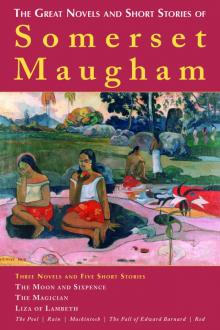 The Great Novels and Short Stories of Somerset Maugham
The Great Novels and Short Stories of Somerset Maugham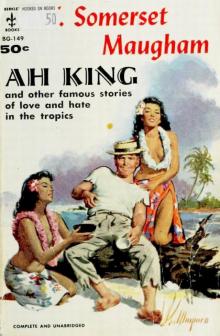 Ah King
Ah King The Explorer
The Explorer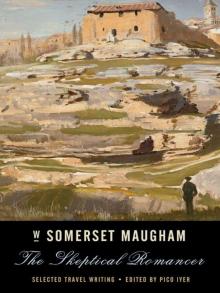 The Skeptical Romancer: Selected Travel Writing (Vintage Departures)
The Skeptical Romancer: Selected Travel Writing (Vintage Departures)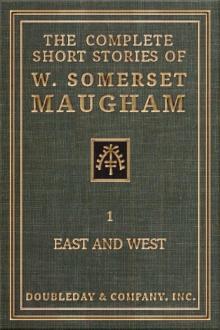 The Complete Short Stories of W. Somerset Maugham - I - East and West
The Complete Short Stories of W. Somerset Maugham - I - East and West